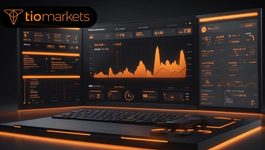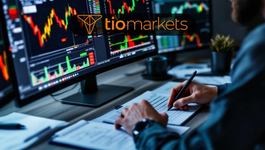CFDs vs Options: Key Differences Explained | TIOmarkets
BY TIOmarkets
|June 11, 2024In the dynamic world of trading, Contracts for Difference (CFDs) and options stand out as two of the most popular instruments. Each offers unique advantages and challenges, catering to different trading strategies and risk appetites. This article delves into the key differences between CFDs and options, providing traders with a comprehensive understanding to make informed decisions.
Understanding CFDs
CFDs are derivative instruments that allow traders to speculate on the price movements of assets without owning them. They offer the flexibility to profit from both rising and falling markets.
How CFDs Work
When trading CFDs, you enter into a contract to exchange the difference in the price of an asset from when your position is opened to when it is closed. You can go long (buy) if you believe the asset's price will rise or short (sell) if you expect it to fall.
CFDs are traded on margin, meaning traders can control large positions with a relatively small amount of capital. However, this also amplifies potential losses as well as gains.
Advantages of CFDs
- Leverage: CFDs provide high leverage, allowing traders to maximize their trading capital.
- Market Access: Traders can access a wide range of markets worldwide, including stocks, forex, indices, and commodities, all from a single platform.
- Going Short: CFDs make it straightforward to short sell, offering profit opportunities in falling markets.
Risks of CFDs
- Leverage Risks: While leverage can magnify profits, it also increases the potential for significant losses.
- Market Volatility: CFDs are susceptible to sudden market movements, which can lead to rapid losses.
Understanding Options
Options are financial derivatives that give the buyer the right, but not the obligation, to buy or sell an underlying asset at a predetermined price on or before a specific date.
How Options Work
Options are categorized into two types: calls and puts. A call option gives the holder the right to buy an asset, while a put option gives the right to sell. Traders use options for speculation or to hedge existing positions against price movements.
Options are also characterized by their expiration dates, after which the contract becomes worthless if not exercised. This aspect introduces a time decay factor, where the value of the option decreases as it approaches expiry.
Advantages of Options
- Risk Limitation: For buyers, the risk is limited to the premium paid for the option, offering a defined risk profile.
- Strategic Versatility: Options provide a variety of strategies, from simple calls and puts to complex spreads and combinations, catering to different market views and risk tolerances.
- Hedging: Options are an effective tool for hedging, allowing traders to protect other positions or their entire portfolio against adverse price movements.
Risks of Options
- Time Decay: The value of options decreases over time, especially as the expiration date nears, which can erode profits for holders.
- Complexity: Options strategies can be complex and require a thorough understanding to execute effectively.
CFDs vs Options: Key Differences
While both CFDs and options offer opportunities for leverage and market speculation, they cater to different trading needs and strategies.
Leverage and Margin
CFDs typically offer higher leverage than options, meaning the potential for both higher profits and losses from a smaller initial investment. Options, however, require the payment of a premium upfront, which is the maximum loss the buyer can incur.
Market Access and Flexibility
CFDs allow for direct speculation on the price movement of assets and are ideal for short-term trading strategies. Options offer a broader range of strategic possibilities, from simple directional trades to complex hedging strategies.
Risk and Reward
The risk-reward profile of CFDs is symmetrical, with the potential for unlimited gains or losses. In contrast, options provide an asymmetrical risk-reward, where the buyer has a limited risk (the premium paid) and potentially unlimited upside.
Expiration Dates
CFDs do not have expiration dates, allowing positions to be held indefinitely as long as margin requirements are met. Options have predetermined expiration dates, after which they become worthless if not exercised.
Additional Considerations for CFDs
One key aspect to consider when trading CFDs is the concept of overnight financing charges. These charges are applied when a position is held overnight and can impact the overall profitability of a trade. Traders need to factor in these costs when planning their trading strategies to avoid unexpected expenses eating into their gains.
Managing Risk in CFD Trading
Risk management is crucial in CFD trading due to the amplified leverage that can lead to significant losses. Setting stop-loss orders, diversifying your portfolio, and avoiding overleveraging are essential strategies to protect your capital and trade responsibly.
Exploring Advanced Options Strategies
For experienced traders looking to delve deeper into options trading, exploring advanced strategies such as straddles, strangles, and iron condors can provide additional opportunities to profit from various market conditions. These strategies involve combinations of calls and puts to create positions that benefit from volatility or lack thereof in the underlying asset.
Understanding Implied Volatility
Implied volatility is a critical concept in options pricing that reflects the market's expectations for future price fluctuations. High implied volatility indicates a greater expected range of price movement, leading to higher option premiums. Traders can use implied volatility levels to assess the market's sentiment and make informed trading decisions.
Conclusion
Choosing between CFDs and options depends on your trading strategy, risk tolerance, and market outlook. CFDs offer simplicity and the potential for high leverage, making them suitable for short-term, high-risk strategies. Options, with their strategic versatility and defined risk profile, cater to a broader range of trading objectives, including long-term hedging and income generation. As with any trading instrument, understanding the inherent risks and conducting thorough research is paramount to success.
Start Trading CFDs and Options with TIOmarkets
Now that you understand the key differences between CFDs and options, take the next step in your trading journey with TIOmarkets. As a top-rated forex broker, we offer a robust online trading platform where you can trade over 300 instruments across Forex, indices, stocks, commodities, and futures markets. With low fees and a global presence in over 170 countries, TIOmarkets is the ideal partner for both novice and experienced traders. Enhance your skills with our comprehensive educational resources and step-by-step guides. Ready to dive into the world of trading? Create a Trading Account today and join our community of 170,000+ traders!

Risk disclaimer: CFDs are complex instruments and come with a high risk of losing money rapidly due to leverage. You should consider whether you understand how CFDs work and whether you can afford to take the high risk of losing your money. Never deposit more than you are prepared to lose. Professional client’s losses can exceed their deposit. Please see our risk warning policy and seek independent professional advice if you do not fully understand. This information is not directed or intended for distribution to or use by residents of certain countries/jurisdictions including, but not limited to, USA & OFAC. The Company holds the right to alter the aforementioned list of countries at its own discretion.
Join us on social media

Behind every blog post lies the combined experience of the people working at TIOmarkets. We are a team of dedicated industry professionals and financial markets enthusiasts committed to providing you with trading education and financial markets commentary. Our goal is to help empower you with the knowledge you need to trade in the markets effectively.
Related Posts





